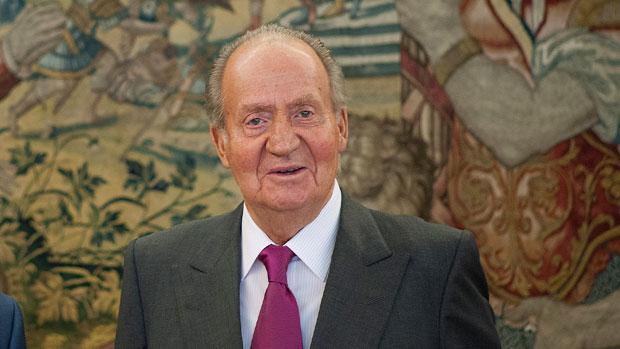King Juan Carlos of Spain to abdicate
King Juan Carlos, who guided country from dictatorship to democracy, will be replaced by Prince Filipe

A free daily email with the biggest news stories of the day – and the best features from TheWeek.com
You are now subscribed
Your newsletter sign-up was successful
King Juan Carlos of Spain, the man credited with steering his country towards democracy after the death of the dictator Francisco Franco in 1975, is to abdicate.
The announcement was made by Spain's prime minister Mariano Rajoy.
"His Majesty King Juan Carlos has just informed me of his desire to renounce the throne and begin the process of succession," Mr Rajoy said. "I'm convinced this is the best moment for change."
The Week
Escape your echo chamber. Get the facts behind the news, plus analysis from multiple perspectives.

Sign up for The Week's Free Newsletters
From our morning news briefing to a weekly Good News Newsletter, get the best of The Week delivered directly to your inbox.
From our morning news briefing to a weekly Good News Newsletter, get the best of The Week delivered directly to your inbox.
The 76-year-old king will be replaced by his son, Felipe.
According to the BBC, Juan Carlos was long seen as "one of the world's most popular monarchs".
Juan Carlos became king on November 22, 1975, two days after the death of Franco, who had named him as his successor.
Over the subsequent months, the king quickly dismantled the institutions of Francoism – a move which made him a constitutional monarch under a newly democratic system. In 1981, Juan Carlos stood firm against a military coup, which, according to The Times, "won him international respect – and the adoration of his people".
A free daily email with the biggest news stories of the day – and the best features from TheWeek.com
Rajoy said that Juan Carlos had been a "tireless defender of our interests".
The king's popularity "dipped" in recent years, The Guardian says, after his reputation was diminished by a spate of scandals. In 2012, during the height of the financial crisis, Juan Carlos took a lavish elephant-hunting trip to Botswana. And in February this year his youngest daughter, Princess Cristina, became the first member of the royal family to appear in court as a suspect in a criminal case. Her husband is currently under investigation for embezzlement.
A poll in January found that two thirds of Spanish people believed that abdication was the best option for the king. It also found that the same percentage had a "good" opinion of Prince Felipe.
-
 The Week Unwrapped: Have televised confessions quelled protests in Iran?
The Week Unwrapped: Have televised confessions quelled protests in Iran?Podcast Plus, why has Elon Musk turned from Mars to the Moon? And will the BBC prove to be a puzzles champ?
-
 The week’s best photos
The week’s best photosIn Pictures An Andean god, a rogue squirrel, and more
-
 ‘Zero trimester’ influencers believe a healthy pregnancy is a choice
‘Zero trimester’ influencers believe a healthy pregnancy is a choiceThe Explainer Is prepping during the preconception period the answer for hopeful couples?
-
 Epstein files topple law CEO, roil UK government
Epstein files topple law CEO, roil UK governmentSpeed Read Peter Mandelson, Britain’s former ambassador to the US, is caught up in the scandal
-
 Iran and US prepare to meet after skirmishes
Iran and US prepare to meet after skirmishesSpeed Read The incident comes amid heightened tensions in the Middle East
-
 Israel retrieves final hostage’s body from Gaza
Israel retrieves final hostage’s body from GazaSpeed Read The 24-year-old police officer was killed during the initial Hamas attack
-
 China’s Xi targets top general in growing purge
China’s Xi targets top general in growing purgeSpeed Read Zhang Youxia is being investigated over ‘grave violations’ of the law
-
 Panama and Canada are negotiating over a crucial copper mine
Panama and Canada are negotiating over a crucial copper mineIn the Spotlight Panama is set to make a final decision on the mine this summer
-
 Why Greenland’s natural resources are nearly impossible to mine
Why Greenland’s natural resources are nearly impossible to mineThe Explainer The country’s natural landscape makes the task extremely difficult
-
 Iran cuts internet as protests escalate
Iran cuts internet as protests escalateSpeed Reada Government buildings across the country have been set on fire
-
 US nabs ‘shadow’ tanker claimed by Russia
US nabs ‘shadow’ tanker claimed by RussiaSpeed Read The ship was one of two vessels seized by the US military